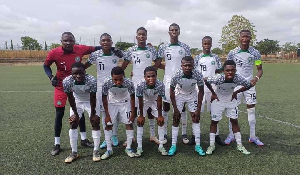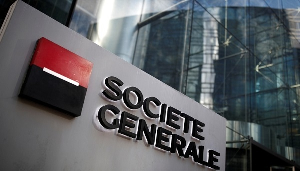- Home - News
- TWI News | TV
- Polls
- Year In Review
- News Archive
- Crime & Punishment
- Politics
- Regional
- Editorial
- Health
- Ghanaians Abroad
- Tabloid
- Africa
- Religion
- Election 2020
- Coronavirus
- News Videos | TV
- Photo Archives
- News Headlines
- Press Release
General News of Thursday, 9 April 2009
Source: GNA
GT-Vodafone agrees with NCA on phone portability
Accra, April 9, GNA - Ghana Telecom (GT-Vodafone) on Thursday agreed with the National Communications Authority (NCA) that mobile number portability (MNP) was cumbersome and costly, saying the experience of other jurisdictions indicated that MNP usually led to wasteful use of resources.
In response to a questionnaire administered by the GNA, Major Albert Don-Chebe, Director of Corporate Communication of GT-Vodafone, noted that the experience of MNP was that a much lower volume of customers actually port their number than regulators' anticipated.
"For example, in South Africa, where MNP has been in place since November 2006, only 280,000 subscribers out of 48 million subscribers had ported their numbers in the first two years of operation. "This is a market where pre-paid churn runs at 40-50 per cent, meaning the percentage of customers porting their number is in the low single figures; this experience is matched elsewhere around the world," he said.
The NCA position on MNP was in respect of challenges with porting time, frequency of porting and the projected relative high cost of porting versus the current low cost of sim cards. Maj. Don-Chebe said given that the actual volume of ports, and hence the volume of calls to ported numbers, is generally much lower than regulators anticipated, MNP systems were often over-specified and so a wasteful use of resources.
He observed that what made MNP cumbersome was the need to get operators together to design a practical and appropriate system, and implement it successfully.
Maj. Don-Chebe noted that the real challenges lay in designing a system which operated smoothly, allowing time for implementation and testing, and developing robust rules around the commercial and technical processes between operators so that the consumer's interests were looked after.
Even though he could not say exactly how much it would cost to implement MNP in Ghana, he pointed out that in South Africa, MNP costs in the order of 5.2 million euros for internal development only and a further 11.5 million euros to build the central database system which needs to be shared between the three operators in that country. The central database system is where all ported numbers are kept and shared between the networks so they could easily trace ported numbers to their new networks for the purposes of routing both local and international calls to those numbers.
As per the cost of MNP for individual operators he said "I think that the costs will be greater for the older operators".
Maj. Don-Chebe asked: Where a new entrant was allowing customers to pre-register their choice of number, so that all that changes was the network prefix, "why go through the cost of installing a complex technical solution to a problem which doesn't exist?" In terms of the system of porting that would be suitable for Ghana he said there were benefits and disadvantages to both donor-led and recipient-led porting even though some experts articles had said that recipient-led porting was more in the interest of the subscriber. Donor-led porting is the one initiated by the network that the subscriber is migrating from and the recipient-led porting is the one initiated by the network that the subscriber is question is migrating to.
Experts maintain that donor-led porting provides the opportunity for the operator losing a subscriber to either sabotage the porting process or to try to win back the subscriber in a subtle way. "It is too simplistic to say that donor-led porting is bad; what is most important is to ensure that whichever solution is chosen, there are clear rules governing each operator's responsibility to its old/new customer," he said.
Maj. Don-Chebe said GT-Vodafone was of the view that there was nothing particularly wrong with the "win-back" marketing under the donor-led system, adding that it was an opportunity for a network to offer a customer a better deal if that customer indicated that he was thinking of moving. "What is wrong with allowing an operator to try to keep a valued customer?" he asked.
Maj. Don-Chebe said the critical factor for success would be to convene a practical working party - with each operator contributing technical staff and committed to implementing the solution which is designed. He said customer service "must" be paramount, and that required a well-designed, well-tested system, adding that will take months, not days, to implement. Meanwhile the Minister of Communications, Mr. Haruna Iddrisu, has declared his intention to ensure the speedy implementation of MNP to empower mobile telecom subscribers with flexibility of choice of network whiles maintaining their current phone numbers including the prefix (network code of the previous operator). 9 April 09










